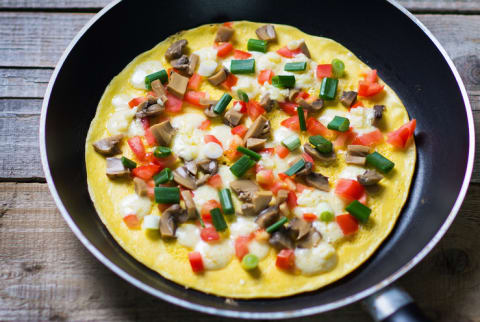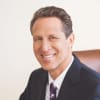Advertisement


Over my several decades as a doctor, I’ve seen numerous patients who struggle to lose weight. And more often than not, a quick look at their food journals tells me why.
Striving to save calories, these patients skip breakfast — and sip on “skinny lattes” or graze on manufactured low-fat Frankenfoods instead.
After all, eating breakfast is more than just “breaking” your overnight “fast.” It also sets the tone for a day of making wise, healthy food choices.
Skip Breakfast, Gain Weight
You might think that skipping out on breakfast will reduce your overall calorie intake for the day.
Unfortunately, the opposite is often true. Not eating a morning meal means you actually eat more throughout the day. And one study among healthy, lean women found that skipping breakfast can impair insulin sensitivity and lead to weight gain.
Take sumo wrestlers for example, who never eat breakfast. They wake up, skip breakfast, and then train strenuously for five hours. By the time they sit down to eat, they feel famished and overeat.
Something very similar happens when you skip breakfast, work through lunch, and finally return home in the evening: You eat everything in sight. You feel stuffed, sick, and guilty.
Want further proof? A recent study found that almost 80% of 3,000 people who lost an average of 70 pounds and kept it off for six years ate breakfast regularly. On the other hand, only 4% of those who never ate breakfast kept the weight off.
The only difference between the two groups was that the group who lost weight ate breakfast and the other group did not. They both consumed the same number of calories and types of food.
It turns out that while the type of calories you eat determines losing weight and maintaining weight loss, so does the time of day that you eat.
Bottom line: Breakfast is that important.
A Word of Warning: Don’t Turn Breakfast Into Dessert
Equally bad as missing out on breakfast is making it into dessert.
Of course, MindBodyGreen readers probably don’t eat ice cream for breakfast. But you might not realize that many cereals, toaster concoctions, muffins, and other items — even the “healthy” versions — contain as much, if not more, sugar as ice cream.
So eat breakfast, but do it correctly. Bypass the cereal aisle and all the manufactured concoctions that carry a healthy halo, trying to pass off as a smart breakfast.
Instead, pack in protein-rich foods like eggs, nut butters, a protein shake, or whole grains with nuts. They’ll steady your blood sugar and reduce metabolic fluctuations later in the day.
In fact, one study found that breakfasts rich in protein can make you feel more full and even reduce snacking later on in the day. And other research has revealed that a protein-rich breakfast can help reduce your hunger hormone ghrelin and increase cholecystokinin (CCK), which signals our brain to stop eating.
How to Start the Day With a Delicious Breakfast
With the countless duties that confront us every morning, many people struggle to have time for breakfast. I find that puzzling, since you can make a healthy omelet with plenty of colorful vegetables in just minutes.
But if even that seems too much, or you’re simply not that hungry in the morning, try a breakfast smoothie instead. You can even pre-prep it the night before to save time.
Below, you'll find my favorite smoothie recipe. It provides protein, healthy fats, antioxidants and major flavor in less time than it takes to order a designer coffee. And it’s a pretty delicious way to start your day, too.
Breakfast Smoothie
- 1 cup frozen blueberries
- 2 tablespoons almond butter
- 2 tablespoons pumpkin seeds
- 2 tablespoons chia seeds
- 2 tablespoons hemp seeds
- 4 walnuts
- 3 Brazil nuts
- 1 large banana
- 1 tablespoon extra virgin coconut oil
- ½ cup unsweetened almond milk
- 1 cup water
Combine all of the ingredients in an electric blender. Then, blend on high speed until smooth (about two minutes). If the shake is too thick, add more water until reaching a thick but drinkable consistency. Serve chilled.
Did you ever think what you were eating for breakfast was healthy only later to learn it wasn’t? Share your formerly “healthy” food on my Facebook fan page.

Dr. Mark Hyman is a practicing family physician and an internationally recognized leader, speaker, educator, and advocate in the field of Functional Medicine. He is the founder and director of The UltraWellness Center, the Head of Strategy and Innovation of the Cleveland Clinic Center for Functional Medicine, a 13-time New York Times best-selling author, and Board President for Clinical Affairs for The Institute for Functional Medicine. He is the host of one of the leading health podcasts, The Doctor’s Farmacy. Dr. Hyman is a regular medical contributor on several television shows and networks, including CBS This Morning, Today, Good Morning America, The View, and CNN. He is also an advisor and guest co-host on The Dr. Oz Show.
More from the author:
Functional Nutrition Training
Check out Functional Nutrition Coaching
A cutting-edge nutrition deep dive taught by 20+ top health & wellness experts
Learn moreMore from the author:
Functional Nutrition Training
Check out Functional Nutrition Coaching
A cutting-edge nutrition deep dive taught by 20+ top health & wellness experts
Learn more
Dr. Mark Hyman is a practicing family physician and an internationally recognized leader, speaker, educator, and advocate in the field of Functional Medicine. He is the founder and director of The UltraWellness Center, the Head of Strategy and Innovation of the Cleveland Clinic Center for Functional Medicine, a 13-time New York Times best-selling author, and Board President for Clinical Affairs for The Institute for Functional Medicine. He is the host of one of the leading health podcasts, The Doctor’s Farmacy. Dr. Hyman is a regular medical contributor on several television shows and networks, including CBS This Morning, Today, Good Morning America, The View, and CNN. He is also an advisor and guest co-host on The Dr. Oz Show.